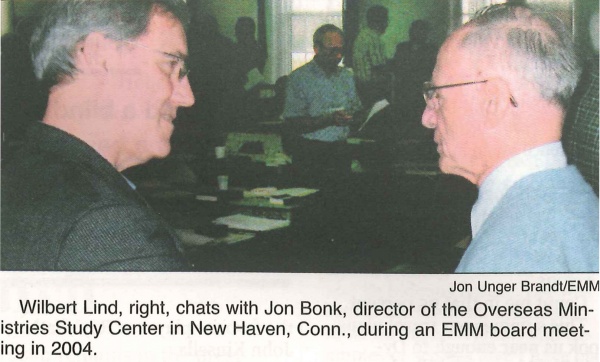If this site was useful to you, we'd be happy for a small donation. Be sure to enter "MLA donation" in the Comments box.
Lind, Wilbert (1923-2007)
Mennonite Weekly Review obituary: 2007 Jun 4 p. 6
Birth date: 1923
text of obituary:
By Jewel Showalter
Eastern Mennonite Missions
LITITZ, Pa. — The death on March 9 of 84-year-old Wilbert Lind gave occasion to remember the pioneering life of the first Eastern Mennonite Missions workers in Somalia and the enduring legacy of the Mennonite presence in that troubled land.
After more than a decade of anarchy and clan warfare, Somalia today is a difficult country to enter. It was difficult in 1954, too but for different reasons.
After a monthlong trans-Atlantic voyage, Wilbert and Rhoda Lind, with 2-year-old Daniel, arrived in the port city of Mogadishu, the capital city of Somaliland, a new United Nations trusteeship. From the decks of the steamer, a large crane hoisted them onto the floor of a bobbing dinghy that took them through the shallows to the beach.
The Lind family found rooms in an Italian hotel in the ancient city, where the great stone houses of the rich contrasted sharply with the mud-and-wattle homes of the poor.
From their tiny beachhead in Mogadishu, Wilbert — or Bert, as his friends called him — hired a Somali translator and criss-crossed the country in the mission's Chevy Suburban Carryall.
Driving 2,200 miles through sand and thorn brush, Lind talked and prayed, building relationships and making decisions about where to locate stations for the young Mennonite mission in Somalia.
Despite opposition and some propaganda against the "infidels," as the Mennonites were called, a local clan chief declared, "Allah wills for you to be here!" at the groundbreaking ceremony for the first mission school.
"It was incredible to see the number of relationships and open doors that Bert had opened for the mission," said Harold Reed, a missionary colleague who arrived in 1961. "There were elementary schools and clinics in three locations, a boarding school and a hospital."
Soon, local Muslims who had been initially resistant expressed appreciation and support and began sending their own children to the schools. Government officials praised the work.
And as Mennonites and Muslims lived side by side, there were inevitable requests for Bibles and explanations of Christian faith. Secret inquirers studied quietly with various missionaries.
But in 1963, three years after independence, the Somali Republic issued a decree barring Christian teaching.
Ivan Leaman, a medical doctor, and his wife, Mary Ellen, were colleagues of the Linds. They remember Wilbert Lind, in this tense atmosphere, telling about his conversation with a Somali who wanted to debate religion: "I don't argue about faith," Lind said. "I simply share what Jesus means to me."
After 14 years in Somalia, the Linds returned to the United States, where Wilbert Lind served as an overseer of churches in the New England district of Lancaster Mennonite Conference from 1985 to 1990. Freeman Miller, director of Home Ministries for EMM at the time, described Lind's service as "tireless, faithful, enthusiastic and excellent."
"I was often impressed by the spontaneous expressions of gratitude by the church planters and their wives in reference to [Lind's] bishop work," Miller said.
Lind also served as a member of the EMM board for 13 years and continued to attend the bi-monthly meetings as an honored guest even after his term expired. His eyes sparkled at any mention of Somali concerns. He took a keen interest in new work opening in Muslim-majority nations.
Until illness prevented him from attending, Lind was a faithful member of a Somali prayer fellowship that meets monthly at Landis Homes Retirement Community.
More than 200 workers have served with EMM among Somalis in East Africa since the Linds arrived there in 1953.
"Their effort was significant," said Mark Logan, who served with EMM and Mennonite Central Committee in Kenya from 2000 to 2004. "We never cease to be awed by how Somalis regard the name 'Mennonite.' Their faces light up with recognition. The name of the 'Mennonite Mission Clan' is the seal of our acceptance and a form of safe passage."
There have been no resident Mennonite workers in Somalia since 1993. Joint EMM and MCC efforts continue with Somalis in peacemaking, education, fellowship, development and relief from Kenya and the United States.
"There is urgent need for a new generation of Mennonites to pick up the vision for Somalia," said Clair Good, representative to Africa for EMM. "While we are praying and asking God what forms our ministry should take in this era, we continue to carry the people of Somalia in our hearts."
